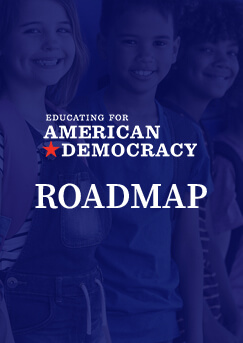Get the Roadmap and Report to unlock the work of over 300 leading scholars, educators, practitioners, and others who spent thousands of hours preparing this robust framework and guiding principles. The time is now to prioritize history and civics.
Past Events
Educating for American Democracy National Forum
SXSWEDU 2021 - A New Roadmap for K-12 History and Civic Education
A viewpoint, demographically, and professionally diverse national network of 300+ scholars, educators and practitioners have created a roadmap for excellence in civic and history education for all K1-2 students. Funded by $1.1mm from NEH and US DoEd and led by ASU, Harvard, iCivics and Tufts, the Educating for American Democracy initiative gives national guidance on content and instructional strategies that are a starting point for the design of state standards, curricula, and resources.
This panel discusses why diversity of thought and background is so important in creating a modern history and civics that speaks to all students, the key approaches that the EAD adopts in its roadmap, the implementation plan, and how to build civic agency, give the full narrative of America’s plural and shared story, promote compromise, and cultivate civic honesty.
Speakers
- Danielle Allen, James Bryant Conant University Professor at Harvard University, and Director of Harvard’s Edmond J. Safra Center for Ethics, Harvard University
- Louise Dubé, Executive Director, iCivics
- Paul Carrese, Director and Professor School of Civic and Economic Thought and Leadership, Arizona State University
June 28, 2021 | Seeking a Truce in the Civics & History Wars: Is 'Educating for American Democracy' the Answer?
Like the cicadas now infesting the mid-Atlantic, debates over how to present American history and civics to our children come around with striking regularity. In the early 1990s, the focus was on proposed national standards for U.S. history, which the Senate eventually condemned with a vote of 99–1. A few years ago, the dust-up was over the Advanced Placement U.S. History course. Today, it’s the backlash to the New York Times’ 1619 project, Donald Trump’s 1776 Commission, and the fight over “woke” history—all while current events (especially the January 6th insurrection) give many Americans angst about the future of democracy itself.
Stepping into the breach is a project funded by the National Endowment for the Humanities and U.S. Department of Education, seeking to find a path forward: the Educating for American Democracy (EAD) Roadmap, released earlier this year with much fanfare. This initiative brought together over 300 academics, historians, educators, and other experts, individuals with very different perspectives and backgrounds, with the goal of issuing guidance for excellence in K–12 U.S. history and civics instruction, and doing so with consensus. It’s been widely praised, but also criticized.
The question is whether the document succeeds at its stated goal. Does it fairly represent a diversity of political points of view, while being intellectually rigorous, content rich and pedagogically workable? Or is bias apparent in the final product?
On Monday, June 28, Danielle Allen, political theorist at Harvard and one of the authors of the EAD Roadmap, and Mark Bauerlein, professor at Emory University and a critic of EAD, debated these important questions. The discussion was moderated by Fordham Institute president Michael J. Petrilli.
May 14, 2021 | Panel Discussion: Commonwealth Club - Powerful Civic Education: It's Everyone's Responsibility
This program featured several leaders who specifically do not represent traditional social studies, civics or American history teachers about why they believe it is their responsibility to be part of the comprehensive civics education solution. Each has played a role in the development of the important EAD effort. We heard from the head of the organization that represents English teachers, the head of an organization that represents all rural schools, and a civics education specialist at a presidential library.
This program also helped the Club commemorate the one-year anniversary of the launch of its own civic education effort. In response to the same concerns that drove the development of EAD, The Commonwealth Club recognized that it, as a major civic forum, could play a more significant role in having a citizenry and electorate better appreciate the U.S. form of government and its civic ideals.
April 26, 2021 | Aspen Group International - An Urgent Call to Action: Student Citizenship
A virtual seminar hosted by Aspen Group International on Coherent Governance issues, led by districts that are pioneering good work. Ace Parsi, Outreach & Dissemination Leader for Educating for American Democracy (EAD), presented the Roadmap to Educating for American Democracy.
April 22, 2021 | Professional Development Series - Session 1: Motivating Student Agency and Exploring America’s Shared Story
This three workshop series, led by Natacha Scott, Director of Educator Engagement at iCivics, will introduce educators to the Educating for American Democracy (EAD) Roadmap by diving deeper into the design challenges, themes, and pedagogy principles. Each session will provide opportunities for participants to connect with peers, engage with the content of the Roadmap, and reflect on connections to their current instruction.
Our first EAD PD workshop discussed the first two design challenges focused on motivating student agency and exploring America’s shared story. This Session engaged participants in supporting their students to understand their roles as engaged citizens who also sustain civil disagreement and civic friendship. Additionally, participants began exploring how we can integrate the perspectives of Americans from diverse backgrounds into our narration of U.S. history.
April 21, 2021 | Our Common Purpose Panel Discussion - Investing in Civic Education and Our Democracy
A healthy democracy requires citizens who have the skills and knowledge to participate fully in the democratic process. The American Academy of Arts and Sciences’ Our Common Purpose report found that, even in today’s polarized political era, Americans across the country agree that the United States needs to invest in its civic education for young people. There is less agreement on what exactly that education should cover. A new report from Educating for American Democracy (EAD) brought together leaders from around the country and across the political spectrum to develop a roadmap toward a new, national commitment to civic education.
Please join representatives from the American Academy and Educating for American Democracy for a critical conversation with students, educators, and scholars about the role of civic education in fostering a new generation of empowered citizens committed to forging a vibrant democracy.
This program will spotlight the recommendation to invest in civic education from the Academy report, Our Common Purpose: Reinventing Democracy for the 21st Century, as well as the EAD’s report, Roadmap to Educating for American Democracy.
April 19, 2021 | National Council of Teachers of English Leadership and Advocacy Summit - Civic Literacy Chat
NCTE’s Annual Leadership and Advocacy Summit provides an opportunity to learn with prominent thought leaders about pressing issues in literacy education. This year’s Summit included a Civic Literacy Chat with Kimberly Eckert, Director, Educator Development, Louisiana Department of Education and Emma Humphries, Chief Education Officer, iCivics discussing the Educating for American Democracy initiative.
April 12, 2021 | #sschat Twitter Chat - Navigating History and Civics with the #EADRoadmap
The Educating for American Democracy team hosted #sschat, social studies Twitter chat to discuss navigating the teaching of history and civics with the EAD Roadmap. Explore the summary of the Twitter chat.
April 7, 2021 | National Association of Counties - Educating for American Democracy with iCivics
The National Association of Counties and iCivics discussed how county leaders can support civic education on a local level and empower, educate and engage. This webinar focused on resources for counties, junior and senior high school curricula, activities for elementary students, and online educational games.
Panelists:
- Emma Humphries, Chief Education Officer and CivXNow Deputy Director, iCivics
- Natacha Scott, Director of Educator Engagement, iCivics
April 1, 2021 | NCSS Panel Discussion and Member Town Hall - Educating for American Democracy
Toxic civic dialogue? Insurrection? Decline of democracy? America needs quality civic and history education more than ever. NCSS has been a lead supporter and partner in the development of Educating for American Democracy, an initiative that promises a greater emphasis on civic and history education that is powerful, interdisciplinary, and inquiry-based. Moderated by NCSS President, Stefanie Wagner, this NCSS in a virtual Town Hall presented the EAD initiative and discussed actions needed to make the promise of Educating for American Democracy a reality for all learners.
Panelists discussed:
- What is Educating for American Democracy (EAD)?
- What are the opportunities and considerations for educators as they work to implement the Roadmap to Educating for American Democracy?
- What are the civil rights implications of this initiative to promote equity and inclusion?
Breakout topics and questions included:
- What are potential roadblocks and challenges in implementing EAD and how can we overcome them?
- What other stakeholders do we need to engage to make the promise of Educating for American Democracy a reality?
- What supports ensure this is a true civil rights initiative?
- Who feels this fits into their existing work and would like to connect to collaborate on launching this effort in the 2021-22 school year?
Panelists:
Dr. Danielle Allen, Principal Investigator and a lead author of the Educating for American Democracy Report; Director of the Edmond J. Safra Center for Ethics at Harvard University
Dr. David Bosso, 2012 Connecticut Teacher of the Year | National Teachers Hall of Fame, Class of 2019
Dr. Lynn Jennings, Senior Director of State and National Partnerships at Education Trust
March 23, 2021 | Share My Lesson's Virtual Conference Keynote - Danielle Allen Shares the Roadmap For Excellence In History And Civics For All Learners
Dr. Danielle Allen, Director of Harvard’s Edmond J. Safra Center for Ethics, joined Share My Lesson to discuss the urgent need to prioritize history and civics, introduce Educating for American Democracy (EAD) initiative and the EAD Roadmap, and discussed the various ways in which educators can get involved.
March 25, 2021 | Panel Discussion: Creating an Inclusive Civic and History Education for All
Educating young people to take active, constructive roles in our democracy is important for all learners. It is particularly so for young people with learning and attention issues and other disabilities who often find themselves marginalized in decisions that affect them. This is why the Learning Disabilities Association of America (LDA) and Emerging America are proud partners of the Educating for American Democracy (EAD) initiative, an important new movement to reprioritize the importance of history and civics learning within K-12 education. Come learn about this initiative, the changes it represents for all learners, the ways it can be leveraged to develop student self-advocacy and self-determination, and how you can join this ground-breaking effort.
The event was moderated by LDA Executive Director, Cindy Cipoletti and feature the following panelists:
- Ace Parsi, formerly Director of Innovation at the National Center for Learning Disabilities and presently the outreach and dissemination lead for the EAD initiative
- Kimberly Eckert, 2018 Louisiana Teacher of the Year
- Rich Cairn, Director of Emerging America
March 5, 2021 | Panel Discussion: Commonwealth Club Educating for American Democracy
Join a conversation on the Educating for American Democracy initiative moderated by Emma Humphries, Chief Education Officer and Deputy Director of CivXNow at iCivics with panelists Paul Carrese, Founding Director of the School of Civic and Economic Thought and Leadership at Arizona State University, Michelle Herczog, Coordinator III of History-Social Science at the Los Angeles County Office of Education, and Kent McGuire, Program Director of Eduction at the William and Flora Hewlett Foundation.
Last year, at the beginning of the pandemic, The Commonwealth Club launched its own civics education effort, Creating Citizens, with founding support from the Koret Foundation. This program is part of that growing effort.



